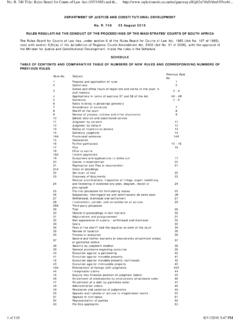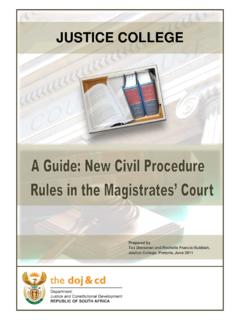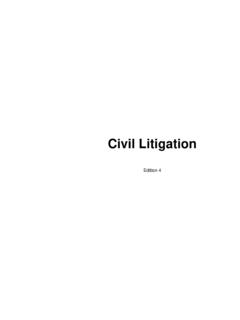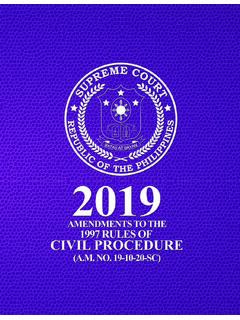Transcription of THE STRUCTURE AND JURISDICTION OF THE COURTS
1 Chapter Three THE STRUCTURE AND JURISDICTION OF THE COURTS This chapter considers the STRUCTURE and JURISDICTION of the criminal and civil COURTS as well as the nature of contemporary Alternative Dispute Resolution within the Ghanaian Legal System. The criminal justice system comprises of various COURTS with criminal JURISDICTION , the lowest in the hierarchy is the District Magistrate court and the highest is the Supreme court . In between these COURTS are the court of Appeal, the regional Tribunal and the Circuit court . OSEI BONSU DICKSON1 Barrister Articles 125 133 of the 1992 Constitution and the COURTS Act, Act 459, as amended by Act 620 covers the respective composition and JURISDICTION of the Supreme court , the court of Appeal, the High court , the Circuit and District court . This chapter also deals briefly with Alternative Dispute Resolution (ADR) mechanisms for settling civil disputes.
2 Upon completion of this topic, you will master the various types of COURTS , their composition and JURISDICTION and ADR as it relates to dispute resolution. 1 BA (Hons), (Hons), (UG), ECNIS (Harvard) BL. Lecturer, Faculty of Law, Wisconsin International University College. This work forms part of a larger on-going work on the Ghanaian Legal System and Contemporary Business law at Lex Mundus & Cencla and the Center for Counseling and Legal Aid International (Cencla International). Whereas it covers the basic essentials it is not intended to be exhaustive of the entire legal and institutional cadastre. INTRODUCTION The Ghanaian court system comprises the following COURTS in a descending order of importance: The Supreme court The Appeal court The High court (Fast Track Division; Commercial Division and; Land Division; Human Right, Labour Division and the Financial Crimes Division).
3 The Circuit court , and The District court There are, however, a number of administrative and quasi-judicial institutions such as the National Labour Commission ( NLC ), the National Media Commission ( NMC ), and Commission of Human Rights and Administrative justice ( CHRAJ ). THE GHANAIAN JUDICIARY The Constitution and the COURTS Act provide for a Judiciary that is headed administratively by a Chief Justice, and a court system that is structured into two broad divisions, namely, the Superior COURTS of Judicature on the one hand and the inferior or Lower COURTS and Tribunals on the 2 The Chief Justice functions as the Administrative head of the Judiciary, with relatively wide supervisory powers. Thus Section 104 of the COURTS Act, 1993 (Act 459) for example, reserves exclusively in the Chief Justice the power to transfer and thereby take away the JURISDICTION of any judge, magistrate or tribunal to hear and determine any pending cause or matter to another competent judge, magistrate or tribunal be it a part-heard or a fresh matter, although, under section 104(1) of Act 459 the transfer order should be under the hand and seal of the Chief Justice.
4 And although under section 104(2) of Act 459 the Chief Justice in a case of urgency could order a transfer by means of a telegraphic, telephonic or electronic communication, but section 104(3) of Act 459 required that unless such an order was confirmed immediately by a written order signed and sealed by the Chief Justice, it would have no effect. When a judge s JURISDICTION over any matter was taken away by the Chief Justice, the only manner by which the JURISDICTION might be restored was by another formal transfer or retransfer under the hand and seal of the Chief Justice under section 104 of Act 459. The Superior COURTS , consisting of the Supreme court , the court of Appeal, the High court and regional Tribunals, are creatures of the Constitution,3 while the Lower COURTS namely the Circuit COURTS , District Magistrate COURTS , Judicial Committee of the National House of Chiefs; the Judicial Committee of the regional House of Chiefs and the Judicial Committees of the various Traditional Councils, are creatures of the COURTS In the exercise of their judicial functions, in both civil and criminal matters,5 all COURTS are empowered to issue any orders and directions that are necessary to enforce their judgments, decrees or orders.
5 Indeed to cement their judicial independence, Article 127(1) of the Constitution, provides expressly that, in the exercise of their judicial function, the Judiciary cannot be subject to the control or direction of any person or authority in Ghana. THE SUPREME court The Supreme court established under the 1992 Constitution, is a Superior court of Record and is the highest court of the land; and it has both criminal and civil The Constitution empowers the court to exercise JURISDICTION in five main areas: General, Supervisory, Appellate, Review and Original JURISDICTION . Historically, the first Supreme court was created in the Gold Coast under the Supreme court Ordinance of 1876. That court inherited the JURISDICTION that the fused English High court had under the Supreme court of Judicature Act, 1873 thus our Supreme court acquired JURISDICTION in both common law and The Supreme court was 3 Article 126 4 Section 29 of Act 459 5 Civil matters relate to disputes between private individuals arising from a contract or tort etc.
6 Criminal matters on the other hand are those matters that relate to crime or activities and which are punishable either by a fine or imprisonment or both a fine and imprisonment. 6 The Supreme court is also Ghana s Constitutional court . 7 But not the review JURISDICTION of the old court of Chancery which had been transferred to the court of Appeal established under the Judicature Act. 1873. And since the common law court had no review JURISDICTION , the earliar Supreme court could not be said to have inherited one under section 11 of the Ordinance. presided over by the Chief Justice who sat with puisne judges appointed by the Governor. COMPOSITION OF THE SUPREME court The Supreme court consists of the Chief Justice and not less than nine other Justices of the Supreme court , but is duly constituted for its work by not less than five Supreme court Justices.
7 The Chief Justice presides at sittings of the Supreme court and in his absence, the most senior of the Justices of the Supreme court presides. No person qualifies for appointment as a Justice of the Supreme court unless he/she is of high moral character and proven integrity and is of not less than fifteen years standing as a lawyer. JURISDICTION OF THE SUPREME court General JURISDICTION Article 129 of the Constitution, 1992 provides that: (1) The Supreme court shall be the final court of appeal and shall have such appellate and other JURISDICTION as may be conferred on it by this Constitution or by any other law. (2) The Supreme court shall not be bound to follow the decisions of any other court . (3) The Supreme court may, while treating its own previous decisions as normally binding, depart from a previous decision when it appears to it right to do so; and all other COURTS shall be bound to follow the decisions of the Supreme court on questions of law.
8 (4) For the purposes of hearing and determining a matter within its JURISDICTION and the amendment, execution or the enforcement of a judgment or order made on any matter, and for the purposes of any other authority, expressly or by necessary implication given to the Supreme court by this Constitution or any other law, the Supreme court shall have all the powers, authority and JURISDICTION vested in any court established by this Constitution or any other law. Original JURISDICTION Article 129 of the Constitution, 1992 provides that: (1) Subject to the JURISDICTION of the High court in the enforcement of the Fundamental Human Rights and Freedoms as provided in article 33 of this Constitution, the Supreme court shall have exclusive original JURISDICTION in (a) all matters relating to the enforcement or interpretation of this Constitution; (b) all matters arising as to whether an enactment was made in excess of the powers conferred on Parliament or any other authority or person by law or under this Constitution.
9 (2) Where an issue that relates to a matter or question referred to in clause (1) of this article arises in any proceedings in a court other than the Supreme court , that court shall stay the proceedings and refer the question of law involved to the Supreme court for determination and the court in which the question arose shall dispose of the case in accordance with the decision of the Supreme court . Appellate JURISDICTION Article 129 of the Constitution, 1992 provides that: (1) An appeal shall lie from a judgment of the court of Appeal to the Supreme court , (a) as of right in a civil or criminal cause or matter in respect of which an appeal has been brought to the court of Appeal from a judgment of the High court or a regional Tribunal in the exercise of its original JURISDICTION ; or (b) with the leave of the court of Appeal, in any other cause or matter, where the case was commenced in a court lower than the High court or a regional Tribunal and where the court of Appeal is satisfied that the case involves a substantial question of law or is in the public interest.
10 (2) Notwithstanding clause (1) of this article, the Supreme court may entertain an application for special leave to appeal to the Supreme court in any cause or matter, civil or criminal, and may grant leave accordingly. (3) The Supreme court shall have appellate JURISDICTION , to the exclusion of the court of Appeal, to determine matters relating to the conviction or otherwise of a person for high treason or treason by the High court . (4) An appeal from a decision of the Judicial Committee of the National House of Chiefs shall lie to the Supreme court with the leave of that Judicial Committee or the Supreme court . Supervisory JURISDICTION Article 129 of the Constitution, 1992 provides that: Article 132 of the Constitution confers JURISDICTION on the Supreme court to supervise pending adjudication in any COURTS and by all adjudicating authorities.







